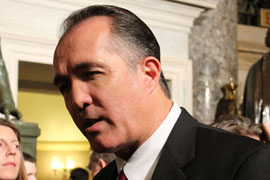Arizona lawmakers split – sharply – over State of the Union address

 By Connor Radnovich and Mary Shinn
By Connor Radnovich and Mary Shinn
Cronkite News
WASHINGTON – For Arizona lawmakers, President Barack Obama’s State of the Union address Tuesday was either an urgent national call to arms or a ruinous plan for big government, depending on which side of the aisle they sit on.
“It was a call to arms, not just a challenge to Republicans but a call to Congress to do something,” said Rep. Raul Grijalva, D-Tucson. “Congress may have seen this as in-your-face, but the American people probably said, ‘Finally.’”
But Rep. David Schweikert, R-Fountain Hills, saw “no interest in bipartisanship” in the speech that was just a continuation of the “left-winged speech he started giving at the inauguration.”
“We did not see a leader willing to work together to solve our economic crisis – we saw wedge politics at its best,” Schweikert said in a prepared statement.
The president’s hour-long speech was heavy on economic themes but also touched on a litany of topics, ranging from a promise to draw down troops in Afghanistan to a challenge to Congress to act on climate change “or I will.”
Obama said the nation has “cleared away the rubble of crisis” but that many “unfinished tasks” remain, including the tasks of strengthening the middle class, boosting manufacturing, creating opportunities for young people and protecting voting rights.
As expected, the president called for comprehensive immigration reform and – in a Capitol where many lawmakers wore green ribbons in memory of those killed in a Newtown, Conn., mass shooting in December – new measures to stem gun violence.
But he also called for an increase in the national minimum wage, more investment in research and education and an approach to budget balancing that includes new revenues and rejects cuts to social programs.
“He talked about raising minimum raise at a time when our economy is still on its knees,” said Rep. Matt Salmon, R-Mesa. “The end result of that will actually be the loss of jobs to people who are at the lowest income levels.”
Salmon, who was in Congress when President Bill Clinton said in a State of the Union address the era of big government was over, said Obama’s speech showed “it’s back.”
“I think that this president came up with more big-government solutions,” said Salmon.
Other Republicans said the speech was heavy on promises but light on specifics on how those new programs would be paid for.
“Every State of the Union is long on promises and programs we can’t afford,” said Sen. Jeff Flake, R-Ariz., who was nonetheless glad to see the president’s call for comprehensive immigration reform.
Rep. Trent Franks, R-Glendale, said that even though there were elements of the speech that everyone can agree with, Obama’s “policy and his words are often times night and day.”
“The president is very good at saying things that we would all agree with but then turning around and doing things that are absolutely antithetical to what he just said,” Franks said.
Franks and some other Republicans bristled at the president’s call for greater gun control. But many of the Democrats listening to the speech said they thought that was one of the areas where lawmakers could reach agreement.
Democrats also said they were pleased to see the president’s emphasis on the economy, noting that an improved economy would go a long way toward helping solve the nation’s budget problems.
“The emphasis on jobs, I thought that was great, and he was getting back to rebuilding our infrastructure,” said Rep. Ed Pastor, D-Phoenix. “All of us, Democrats and Republicans, realize that our infrastructure is deteriorating.”
Pastor, a veteran of 22 State of the Union addresses, called Obama’s speech typical of second-term presidents who lay out “a whole litany” of goals they want to achieve. But he said he was impressed by the amount of attention Obama gave to immigration reform and gun control, issues he think Congress will be able to get done.
Rep. Ron Barber, D-Tucson, listening to his first State of the Union as a member of Congress, said he, too, was glad to hear the president dedicate much of the speech to the economy.
“I was very pleased that the president was focused on the economy, on getting people back to work,” Barber said. “That’s job one.”
Despite the initial reactions to the speech, Barber said he thinks Congress will be able to come together on some issues, pointing to the president’s statement that “none of us will get 100 percent of what we want” but that not reaching agreement would be disastrous.
“I came here to find common ground, I didn’t come here to be a partisan,” he said.
Rep. Kyrsten Sinema, D-Phoenix, said she “heard a lot of issues of common interest in the speech.”
But Rep. Paul Gosar, R-Prescott, said he hopes the president will heed his own calls for compromise.
“You know the president can speak. He has that gift,” Gosar said. “The problem though, in my words, is talk is cheap, actions speak.
He said he hopes the president will “sit down with that speech and really reread it and take it to heart, because there’s some parts in there that embrace that, but we haven’t seen that from this president.”
But Grijalva said the nation has reached a “perfect storm” point on the economy and other issues that may leave lawmakers with no choice but to reach agreement on some issues. A president’s speech “has to be ambitious in these times.”
“What’s on the plate is the economy, the future of our country. What are we going to do about that?” Grijalva said. “It’s not overreaching to lay them all out.”
– Cronkite News Service reporters Vaughn Hillyard and Jessica Goldberg contributed to this report.














